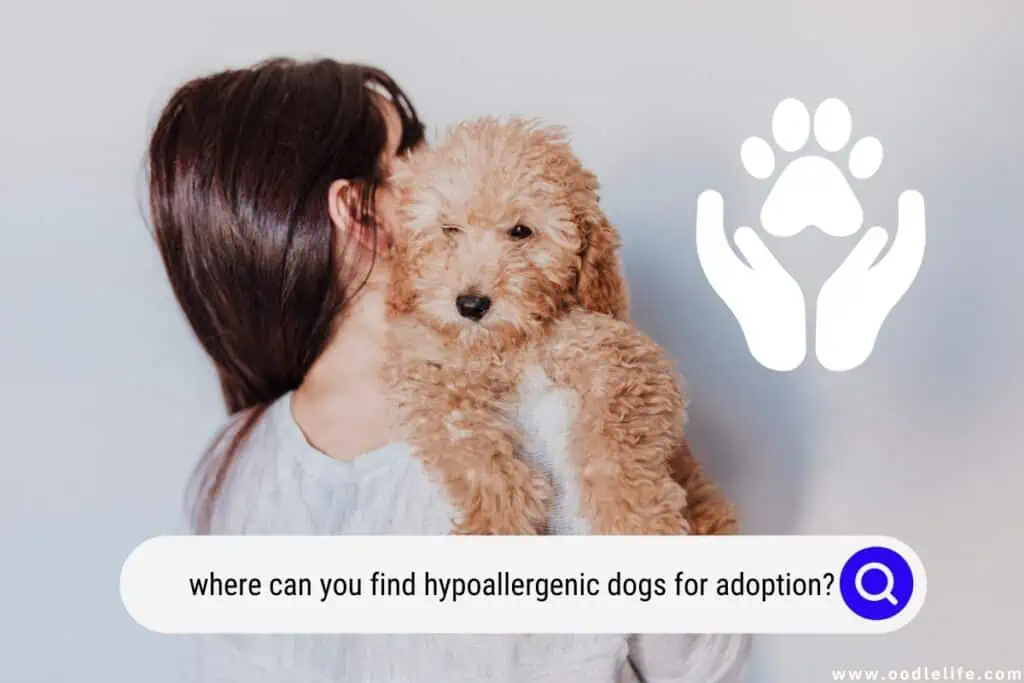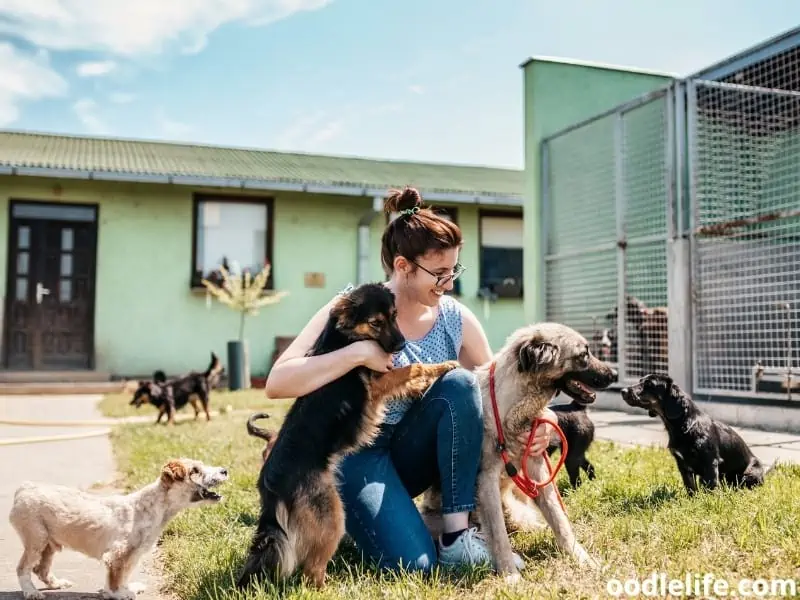Where Can You Find Hypoallergenic Dogs for Adoption? (2024)
Pet allergies are no fun. We love our furry friends and want to be close to them, but pet allergies can often be difficult to detect, especially if you have never been allergic to anything before. Even if someone lives with pets for years without any issues, it’s not uncommon for symptoms to suddenly appear without warning.
Common signs of pet allergies can include a stuffy or runny nose, wheezing, sneezing, itchy eyes, chest discomfort, and even skin rashes. Fret not! There are hypoallergenic dogs around that are unlikely to cause an allergic reaction in someone with a mild pet allergy.

However, finding a hypoallergenic dog for adoption can be a challenge! While many breeds are considered to be hypoallergenic, no dog is 100 percent allergen-free.
In this blog post, we’ll take a closer look at these low-shedding, hypoallergenic dogs, and share how you can potentially find your new bestie.
What Is a Hypoallergenic Dog?
A hypoallergenic dog is a type of dog that is less likely to cause reactions in people with pet allergies. This means that they produce fewer allergens than other breeds, making them a good option for people with allergies.

However, it’s important to note that no dog is completely hypoallergenic, and even so-called hypoallergenic breeds can still cause allergic reactions in some people. It’s always best to spend some time with a dog before committing to owning one to see if you have any adverse reactions to it.
Some Hypoallergenic Dog Breeds
As mentioned earlier, there is no definitive list of hypoallergenic dogs. The term is used to describe dogs that produce fewer allergens than other breeds and are, therefore, less likely to cause allergic reactions in people who are allergic to dogs.

Some popular breeds that are commonly considered to be hypoallergenic include the Poodle, Affenpinscher, Afghan Hound, Maltese, Bichon Frise, and Miniature Schnauzer.
Things to Consider Before Adopting Hypoallergenic Dog
Adopting a hypoallergenic dog can be a great option for people who are allergic to dogs but still want to have a furry companion. These dogs produce fewer allergens than other breeds, making them less likely to cause allergic reactions.
However, there are still some things to consider before adopting a hypoallergenic dog.
1. Even Hypoallergenic Dogs Can Cause Allergic Reactions
First and foremost, it’s important to remember that no dog is completely hypoallergenic. Even so-called hypoallergenic breeds can still cause allergic reactions in some people.

It’s always best to spend some time with the dog before committing to adopting it, to see if you have any adverse reactions to it.
2. They Still Shed
While hypoallergenic dogs generally shed less than other breeds, they still shed to some degree. If you’re someone who doesn’t want to deal with any shedding at all, you may want to consider a hairless breed instead.

3. You Still Need to Groom
Grooming is another important factor to consider when adopting a hypoallergenic dog. Many of these breeds have long, curly coats that require regular grooming to keep them looking and feeling their best.

This can be time-consuming and costly, so it’s important to consider whether you’re willing and able to commit to regular grooming.
4. Size of the Dog
The size of the dog is also an important factor to consider. Hypoallergenic dogs come in all shapes and sizes, from small toy breeds to larger breeds. It’s important to choose a dog that is the right size for your living situation.

For example, if you live in a small apartment, a large breed may not be the best fit.
5. Training and Socialization
Training and socialization are also important considerations when adopting any dog, regardless of breed. All dogs need to be trained and socialized to be well-behaved, and it’s important to be willing and able to invest the time and effort into training and socializing your dog.

Without proper training and socialization, your dog may develop behavior problems that can be difficult to manage.
How To Find Hypoallergenic Dogs For Adaption?
If you’re looking for a hypoallergenic dog, you’re not alone. Countless dogs need homes, and luckily in today’s age, it is not hard to find them. Here are some places where you can find hypoallergenic dogs for adoption.
1. Rescue Groups
Rescue groups are organizations that work to rescue and re-home dogs that have been abandoned, neglected, or otherwise mistreated. Some rescue groups may have hypoallergenic dogs available for adoption, but the availability of these dogs will depend on the specific rescue group and the dogs they currently have in their care.

Contact the rescue group to start the process and let them know you’re interested in adopting a hypoallergenic dog.
Provide them with as much information as possible about your living situation, family, and lifestyle, so they can match you with the right dog. Some rescue groups may have a waiting list for hypoallergenic dogs, so be prepared to be patient.
Overall, rescue groups can be a great source for finding hypoallergenic dogs. By doing your research, contacting the rescue group, and spending time with the dog, you can increase your chances of finding the perfect hypoallergenic companion.
2. Local Shelters
Adopting a hypoallergenic dog from your local shelter can be one of the most rewarding experiences imaginable. Not only are you giving a needy pup the loving home they deserve, but you could also be freeing yourself from allergy worries at the same time.

The number of hypoallergenic dogs in local shelters is rising across the country, and it’s great news for those who have allergies. Additionally, in most cases, adopting a pooch from your local shelter has the added benefit of getting a trained dog.
By adopting locally, you’ll avoid all the added fees associated with adopting farther away or acquiring another type of pet altogether. So if you’re ready to bring a pup into the family, consider heading over to the nearest animal adoption center and asking about their hypoallergenic dogs – you just might find your new best friend!
3. Social Media Platforms
Thanks to technology, it’s possible to adopt a hypoallergenic dog from social media, but it’s important to be cautious and do your research before committing to adopting a dog from this source.

First, carefully review the social media post or advertisement for the dog and make sure that it appears legitimate. Look for red flags or indications that the dog is not being offered by a reputable source, such as unrealistic promises or too-good-to-be-true offers.
If the post or advertisement appears legitimate, contact the person offering the dog for adoption and ask for as much information as possible about the dog’s history, health, and personality.
Be sure to ask for references from previous adopters or veterinarians, and consider asking for a virtual meet-and-greet to get to know the dog and its personality before committing to adopting it.
Overall, adopting a hypoallergenic dog from social media can be a viable option, but it’s important to be cautious and do your research before committing to adopting a dog from this source.
4. Dog Breeders
If you’re looking for a pet that won’t trigger your allergies, why not consider adopting hypoallergenic dogs from breeders?

Always do your research about the breeder and make sure that they are reputable and responsible.
Look for red flags such as large numbers of puppies for sale, puppies that are too young to be separated from their mothers, or puppies that are not healthy or well-cared for.
Reputable breeders will be able to provide you with background information on registries and lineage associated with potential puppies.
When looking for one of these awesome pups, it makes sense to go through a breeder – they will ensure you get the perfect fit within their breed.
Not only will you know what type of dog you’re getting from the get-go, but reputable breeders also provide health clearances and genetic testing, so you can rest assured about your new bestie’s health.
When considering heading to a dog breeder for a pup, it’s important to ask some questions ahead of time. Ask about their experience in the field, inquire which veterinary services they recommend, find out their policy on genetic testing, discover their opinion on spaying and neutering, and look into what kind of training assistance they offer.
It’s also important to follow your intuition – visit the location, meet the staff, and get familiar with the other dogs in residence. Ultimately, make sure that you feel comfortable and secure that a potential new puppy will come from a compatible environment.
5. Petfinder
Petfinder is a website that connects pet owners who need to rehome their pets with adopters who are ready and willing to provide a loving home. It’s a great way for both pets and potential guardians to find the perfect match, and it’s also an invaluable resource in medical situations.

For example, after having surgery, sometimes pet owners may not be able to care for or provide medication for their pet until they recover, but thanks to Petfinder they can be reassured knowing there is someone out there waiting patiently to adopt their beloved companion.
Pet adoption services such as Petfinder simplify the process of finding homes and ensure that animals are provided with the necessary care they deserve.